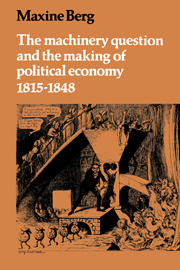Book contents
Summary
In the eighteenth century there was no Machinery Question. The machine was then simply a material contrivance which demonstrated the culmination and success of the division of labour. It was but one of the many novel indications of industry in a largely rural landscape. The technical innovation of the eighteenth century certainly evoked a sense of excitement among contemporaries, and contributed to their belief in economic progress. The intellectuals of the Enlightenment welcomed it as an indicator of economic expansion which they believed would contribute to the general ‘improvement’ of society. But in the early nineteenth century this prospect of a harmonious integration of economic and social improvement was thrown into question. The face of industrialisation now appeared concentrated in the machine. It was the machine which seemed to be responsible for the disharmony of rapidly expanding cotton towns, unprecedented population growth and the economic crisis of the post-Napoleonic years. The eighteenth-century vision of improvement had become the machinery question of the early nineteenth century.
For contemporaries the Industrial Revolution meant steam power and rapid mechanisation in the cotton textile industry. Yet in reality such mechanisation directly affected only a small number of industries and regions, and even in these its permanence might be questioned. For rapid technical change was not the universal experience of the Industrial Revolution; elsewhere it appeared rather as an expansion on the basis of traditionally organised trades and manual labour. But if the economy of early- to mid-nineteenth-century Britain continued to display many traditional features, the discontinuity with the eighteenth century was none the less fundamental.
- Type
- Chapter
- Information
- Publisher: Cambridge University PressPrint publication year: 1980



